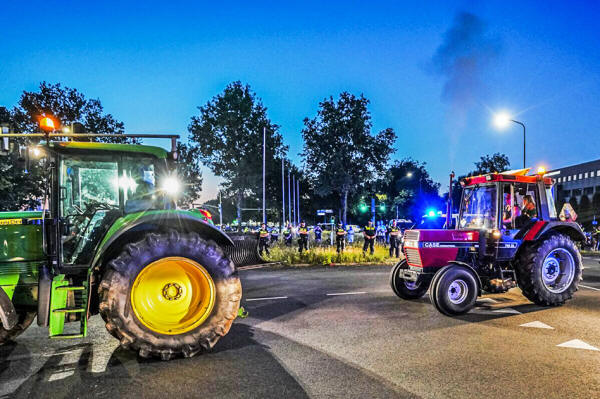|

by Tim Hains
July 22,
2022
from
RealClearPolitics Website

Farmers gather with their vehicles
next to a Germany/Netherlands border sign
during a protest on the A1 highway, near Rijssen, on June 29, 2022,
against the Dutch Government's nitrogen plans.
VINCENT JANNINK/ANP/AFP via Getty Images
Source
Schoellhammer:
People Accepted
the Eccentricities
of their Elite
Minority
until they Felt
the Negative Effects...
There is a "deafening"
media silence about massive anti-government protests
happening around the world, including a farmers' strike in
one of the world's most productive
agricultural countries, the Netherlands, and an overthrow
of the government in Sri Lanka, Webster University assistant
professor Ralph Schoellhammer tells Sky News.

Tractors drive by Dutch police officers standing guard
as dutch police close access to Apeldoorn on the A1 highway
to stop potential farmers demonstrating against the Dutch
government's plans
to cut nitrogen greenhouse gas emissions, on 29 June 2022.
(Jeroen
Jumelet/ANP/AFP via Getty Images)
Source
Schoellhammer wrote in Newsweek:
A
Popular Uprising Against the Elites Has Gone Global - Opinion
July
07, 2022
NEWSWEEK
"This is a
larger trend, we already mentioned Brexit and the election of
Donald Trump were symptoms of the pushback. But the situation we
find ourselves in consists of four different groups," he
explained.
"First are the
activists, who really believe the end of the world is around the
corner. And they are overrepresented in media, in academia, and
in the cultural sphere."
"Next you have governments and politicians who like to
virtue-signal to those people mostly because they are very
active on Twitter. They believe they represent a huge chunk of
the population."
"And then you have companies who want to make a profit off of
it," he added.
"I don't
believe that Unilever cares about the environment but it is
something they have to say to pander to clients."
"The working class and middle class, or people who want to just
pay their taxes and live life, who don't spend a lot of time on
social media are trapped in this, it is more and more
encroaching on their daily lives."
"For example, for Germany to leave nuclear energy behind was a
purely political and ideological position... it turns out they
will get poorer.
They accepted the eccentric ideas of
their
elites to the extent that they did not think it would have a
negative impact on their lives. But now they
see the negative impact."
"It's school policy in Virginia, it is the agricultural policy
in the Netherlands, it is gas prices in France, nuclear energy
in Germany...
I'm very
curious how this is going to work, the future would be something
like you just mentioned, a social-conservative working-class
party... you see this with Hispanics and working-class blacks in
the United States who shift to the GOP because the progressives
in some areas are insane.
They just want
to switch to a common-sense party, I think that is what we see
at the moment."
"There is a deafening media silence on these protests," he
continued.
"If you observe
in the U.S. and Europe where all of sudden there is this worry
among the political and media class about 'disinformation' and
saying... they need to be careful about what information gets
out there.
This is part of
this, the best way to prevent pushback from large numbers of
people is if they don't know that anything is going on."
"Think about the situation with the truckers in Canada
(below video), when
they pulled their bank accounts, made sure GoFundMe pulled their
funding efforts.
This is
undermining the possibility of these people to organize. It is
not a conspiracy, it is what interest groups and these players
do.
They see a
potential threat to their power and they try to undermine it."
|



